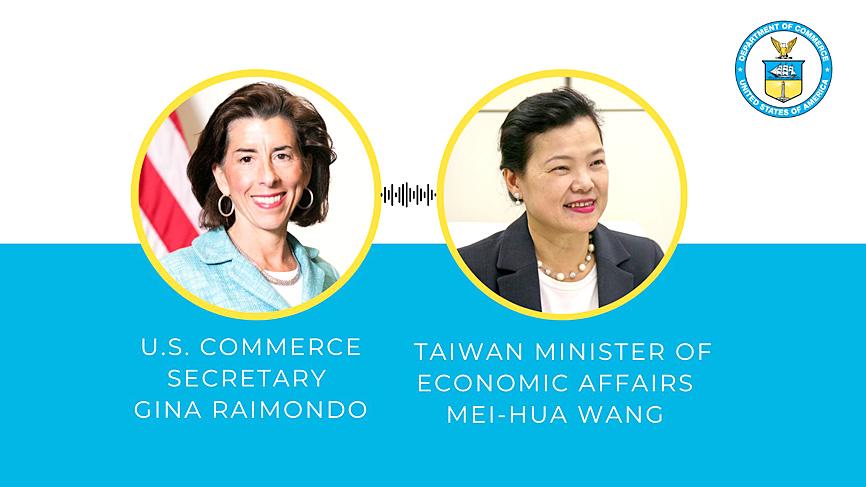Taiwan and the US have established a new bilateral cooperation framework to develop commercial programs and strengthen critical technology supply chains.
Called the Technology Trade and Investment Collaboration (TTIC), it is also to focus on promoting a two-way investment environment, studying industry trends, and exploring new opportunities and investment in the US market, a US Department of Commerce news release said.
The two sides are to designate representatives at the bureau level to plan and convene the first meeting of the TTIC in the coming months, the statement said, while providing few other details about the framework’s functions.

Photo: screen grab from Twitter
Taiwan and the US already communicate on economic issues through two other high-level bilateral economic dialogue platforms — the Trade and Investment Framework Agreement and the US-Taiwan Economic Prosperity Partnership Dialogue.
The forming of the mechanism was announced during an online meeting between Minister of Economic Affairs Wang Mei-hua (王美花) and US Secretary of Commerce Gina Raimondo early yesterday.
During the meeting, Raimondo reiterated Washington’s support for Taipei, and the importance of the bilateral US-Taiwan commercial and investment relationship.
She also expressed the US’ continued interest in working together with Taiwan on issues of common commercial concern, particularly in the area of semiconductor supply chains and related ecosystems, the statement said.
The US has repeatedly pressed Taiwan, as a major chip producer, to do more to help resolve a global shortage of semiconductors, which has shuttered some auto production lines and impacted consumer goods.
Taiwan says it is doing all it can to help.
Taiwan and the US are long-term and reliable supply chain partners, Wang said.
The new framework would help Taiwanese and US companies work closer to promote two-way investment and trade to further deepen the already strong relations between the two nations, Wang was quoted as saying in a statement.
Taiwan also hopes to further work with the US on infrastructure in third nations and in helping Taiwanese firms participate in US President Joe Biden’s “Build Back Better” plan, she said.
Additional reporting by Reuters

ACTION PLAN: Taiwan would expand procurement from the US and encourage more companies to invest in the US to deepen bilateral cooperation, Lai said The government would not impose reciprocal tariffs in retaliation against US levies, President William Lai (賴清德) said yesterday, as he announced five strategies to address the issue, including pledging to increase Taiwanese companies’ investments in the US. Lai has in the past few days met with administrative and national security officials, as well as representatives from various industries, to explore countermeasures after US President Donald Trump on Wednesday last week announced a 32 percent duty on Taiwanese imports. In a video released yesterday evening, Lai said that Taiwan would not retaliate against the US with higher tariffs and Taiwanese companies’ commitments to

‘SPECIAL CHANNEL’: Taipei’s most important tasks are to stabilize industries affected by Trump’s trade tariffs and keep negotiations with Washington open, a source said National Security Council Secretary-General Joseph Wu (吳釗燮) arrived in the US for talks with US President Donald Trump’s administration, a source familiar with the matter said on Friday. Wu was leading a delegation for a meeting known as the “special channel,” the Financial Times reported earlier. It marked Trump’s first use of the channel since returning to the White House on Jan. 20. Citing a source familiar with the matter, the Financial Times reported that Minister of Foreign Affairs Lin Chia-lung (林佳龍) was also a part of the delegation. The visit came days after China concluded war games around Taiwan and amid Trump’s

Intelligence agents have recorded 510,000 instances of “controversial information” being spread online by the Chinese Communist Party (CCP) so far this year, the National Security Bureau (NSB) said in a report yesterday, as it warned of artificial intelligence (AI) being employed to generate destabilizing misinformation. The bureau submitted a written report to the Legislative Yuan in preparation for National Security Bureau Director-General Tsai Ming-yen’s (蔡明彥) appearance before the Foreign Affairs and National Defense Committee today. The CCP has been using cognitive warfare to divide Taiwanese society by commenting on controversial issues such as Taiwan Semiconductor Manufacturing Co’s (TSMC, 台積電) investments in the

HELPING HAND: The steering committee of the National Stabilization Fund is expected to hold a meeting to discuss how and when to utilize the fund to help buffer the sell-off The TAIEX plunged 2,065.87 points, or 9.7 percent, to close at 19,232.35 yesterday, the highest single-day percentage loss on record, as investors braced for US President Donald Trump’s tariffs after an extended holiday weekend. Amid the pessimistic atmosphere, 945 listed companies led by large-cap stocks — including Taiwan Semiconductor Manufacturing Co (TSMC, 台積電), Hon Hai Precision Industry Co (鴻海精密) and Largan Precision Co (大立光) — fell by the daily maximum of 10 percent at the close, Taiwan Stock Exchange data showed. The number of listed companies ending limit-down set a new record, the exchange said. The TAIEX plunged by daily maxiumu in just